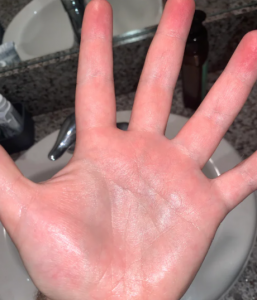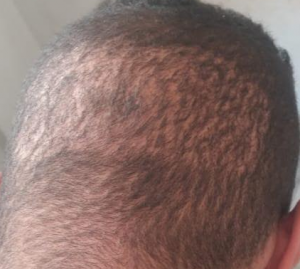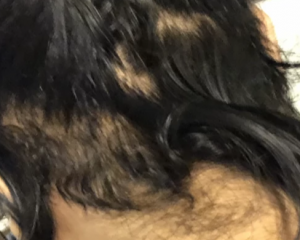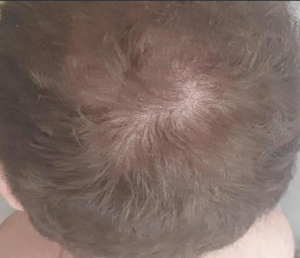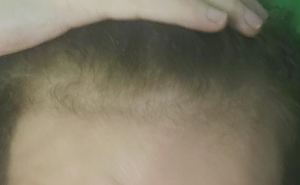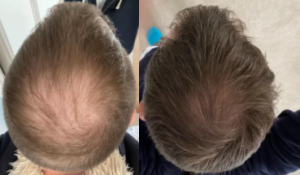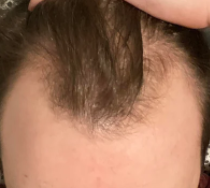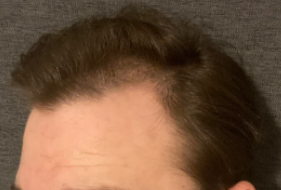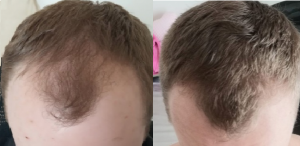I had an FUE transplant a few years ago and I’m not real happy with my hairline. My hairline is a cm or two lower than I’d like, it doesn’t match my temples and it’s a bit low for how thin my hair is. It would look more natural if it were a bit higher.
Has anyone dealt with this or have any suggestions? I’m shaving a bit off of it right now but it certainly looks a bit off as the hair shaft is just shaved. I saw a transplant specialist and they suggested that if I plucked those hairs it would scar. Did she mean that it would show the scars from the implanting of those hairs I plucked? Cause when I have tried plucking before it wasn’t very noticeable to me. Would plucking be a good option? Where do I find a laser if that’s the best option? Do I need a specific laser for scalp? Any other recommendations? Thanks for any advice.
I tried to search this in this subreddit but didn’t find anything with “pluck” or “hairline too low”. I saw a thread or two that looked similar but there were no comments. Through the search though I found out plucking may spur hair growth in the plucked area though?
Hairlines that are placed too low at a hair transplant are a real problem to fix. If you laser the hairs to move it up, there could be scarring seen at the point where each hair follicle was placed as the skin of the graft could be depigmented by the laser and result in a whitish dot. This is particularly a problem the darker your skin is, less of a problem if you skin is very white. The key it to be absolutely sure that you are your surgeon design the hairline so that it is never too low. To high is easy to fix as it can be brought down, but to low, there is little that can be done.
I’m a 26 yr old male, had a HT about 1.5 months ago here in the states. 2500grafts (500 in crown, rest into hairline). I wasn’t on fin at the time however started immediately after the surgery (1mg daily).
I’m experiencing major shedding on the top of my head, like my pillow is covered in hair when I wake up. I know shock loss can happen after surgery but know fin can also cause shedding. Is there any way to differentiate between the two? Not sure if that’s possible but I’m worried about my hair.
Shock loss occurs after a hair transplant. The only prevention for this is the drug finasteride which should be started at least 2 weeks prior to the surgery. The problem is that after the fact, it is not the best solution, but it is better than nothing. I believe that shock loss is largely the loss of miniaturized hairs. The miniaturization doesn’t have to be great (meaning that the shaft thickness could be off by as little as 10-20%) so hairs that can be lost are not easily identified.
—————————————————————————————————————————-
Comment from Reddit: He told me that I can use finasteride but I stopped them because of side effects.
Response: You were in a difficult place and I appreciate the problem. The price of shock loss vs the price of loss of your sex life. It is clear how one choses between them.
I went to the dermatologist to talk about my hairloss. Due to the how fast I lost my hair (almost 70% density in a year), the doctor did a hair biopsy and apparently the results show Alopecia Areata. I have been going back to the dermatologist once a month for the past 2 months for cortisone shots and have not seen any results. I am a bit skeptical about the Alopecia Areata diagnosis, mainly because their is typically a circular bald pattern associated with it and my hairloss isn’t like that.
The picture you show of the back of your scalp is typical of alopecia areata; however, the quality is poor and out of focus. With good photos, one should see on close examination Exclamation Mark hairs in and around the hair loss areas. This is sometimes a difficult problem to reverse. Because the quality of the photos are so poor, Don’t hang your hat on the diagnosis I gave you above until you either send me better photos or see a dermatologist
I know what’s the difference between two cases? DHT miniaturised and non-DHT miniaturesed? What else causes miniaturisation except DHT?
If the miniaturization is DHT dependent, then it occurs in the hairs of the scalp that are susceptible to DHT from genetic causes (i.e. Norwood Class 7 pattern patients). I have believed that the juvenile hairline in most Caucasian men have hairs that have a limited life (i.e. develop apoptosis when the clock reaches its genetic finality which may vary in men between ages 17-29). I have met some men with a Norwood Class 7 pattern who had a persistent juvenile hairline that stayed strong into their 60s. That is why I don’t believe the juvenile hairline is not sensitive to DHT and its loss is apoptosis tied to some biological clock.
If you caught the hair loss in the first year, reversal is more common. Finasteride might stop further loss if it doesn’t bring back the hair you lost.
This is an impressive result; however, I don’t believe that you needed 4500 grafts to get this result. The readership is made to believe that this number of grafts were critical to your balding; however, that is absolutely not the case in my opinion. Your forelock was strong before you did the transplant to it hopefully wasn’t touched. I have had results like this with far fewer grafts.
No real history of MPB in family other than normal hair loss after ~50 years old. I am 23 and was fat all of my childhood. I lost about 70-80 lbs in under a year and a half about 2-3 years ago. I basically lost it in the worst way possible… starving, keto, etc. Barely functioned during that time. Since then my hair seemed noticeably thinner on the entire hairline and crown a bit. However, it seemed to get bad and then stay the same since then. Hasn’t really gotten worse. I read that weight loss can trigger MPB somehow. Does this mean I’m basically starting now what I would start at 45/50 years old? Does it necessarily mean it’s going to keep getting worse? Or is there a chance it’ll take some time? I’d really rather get a hair transplant than take drugs daily.
Significant weight loss causes hair loss. 30 pounds in a month is very extreme. A safe number is 1 pound/week and should reflect a new lifestyle of eating, not crash dieting. Even though your family history doesn’t show balding, you have developed a Norwood Class 3 Vertex pattern of balding which was mot likely accelerated by your crash diet.
Hair transplants generally last your lifetime. I have seem patients I performed hair transplants back in the early 1990s when I started performing FUT procedures and they still have their hair, most of them. A few have come in because further hair loss of their original native hair brought them in. A small percentage of patients do lose their hair transplants, less than 3% I would guess
I would really appreciate your professional opinion on this matter: I have 10-12 kilograms of weight to lose. It’s been a long time since I did sports or any restriction on my diet. The reason of avoiding such dietary and physical stress is to avoid losing hair. Currently I am following a hair loss regime (since December 2019) that is giving me drastic regrowth of my MPB and is reversing it. However because of my overwhelming joy and care about that regrowth, I am afraid of such physical stresses will lead to more hair loss because of shock (TE) and Testosterone rise. What do you think of that? Am I taking it too far in overthinking it? If yes what kind of diet and physical exercises do you recommend?
Good exercise and a reasonably restrictive diet without starvation and with good nutrition will allow you to keep your hair while losing weight.
https://pubmed.ncbi.nlm.nih.gov/32622136/
Conclusion: Oral minoxidil was found to be an effective and well-tolerated treatment alternative for healthy patients having difficulty with topical formulations.
Page 113 of 1239

